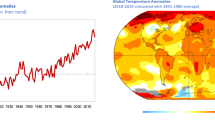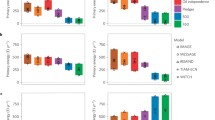Abstract
Energy security is one of the main drivers of energy policies. Understanding energy security implications of long-term scenarios is crucial for informed policy making, especially with respect to transformations of energy systems required to stabilize climate change. This paper evaluates energy security under several global energy scenarios, modeled in the REMIND and WITCH integrated assessment models. The paper examines the effects of long-term climate policies on energy security under different assumptions about GDP growth and fossil fuel availability. It uses a systematic energy security assessment framework and a set of global and regional indicators for risks associated with energy trade and resilience associated with diversity of energy options. The analysis shows that climate policies significantly reduce the risks and increase the resilience of energy systems in the first half of the century. Climate policies also make energy supply, energy mix, and energy trade less dependent upon assumptions of fossil resource availability and GDP growth, and thus more predictable than in the baseline scenarios.





Similar content being viewed by others
Notes
Since WITCH only reported oil trade, the total PES trade equals oil trade in WITCH.
Kriegler et al. (this issue) provide a detailed explanation of the technological capabilities of the two models.
References
Bauer N, Mouratiadou I, Luderer G, Baumstark L, Brecha R, Edenhofer O, Kriegler E (2013) Global fossil energy markets and climate change mitigation: an analysis with REMIND. Climatic change. doi:10.1007/s10584-013-0901-6
Bollen J, Hers S, van der Zwaan B (2010) An integrated assessment of climate change, air pollution, and energy security policy. Energy Pol 38(8):4021–4030. doi:10.1016/j.enpol.2010.03.026
Cherp A, Jewell J (2011) The three perspectives on energy security: intellectual history, disciplinary roots and the potential for integration. Curr Opin Environ Sustain 3(4):202–212. doi:10.1016/j.cosust.2011.07.001
Cherp A, Jewell J (2013) Energy security assessment framework and three case-studies. In Dyer HC, Trombetta M (eds.), International Handbook of Energy Security. Edward Elgar Publishing, Cheltenham, UK, pp. 231–277
Cherp A, Adenikinju A, Goldthau A, Hernandez F, Hughes L, Jansen JC, Jewell J et al (2012) Energy and security. In: Johansson TB, Nakicenovic N, Patwardan A, Gomez-Echever L (eds) Global energy assessment: Toward a sustainable future. Cambridge University Press, Cambridge, pp 325–383
Costantini V, Gracceva F, Markandya A, Vicini G (2007) Security of energy supply: comparing scenarios from a European perspective. Energy Pol 35(1):210–226. doi:10.1016/j.enpol.2005.11.002
Gupta E (2008) Oil vulnerability index of oil-importing countries. Energy Pol 36(3):1195–1211. doi:10.1016/j.enpol.2007.11.011
Grubb M, Butler L, Twomey P (2006) Diversity and security in UK electricity generation: the influence of low-carbon objectives. Energy Pol 34(18):4050–4062. doi:10.1016/j.enpol.2005.09.004
Hoogwijk M, van Vuuren D, de Vries B, Turkenburg W (2007) Exploring the impact on cost and electricity production of high penetration levels of intermittent electricity in OECD Europe and the USA, results for wind energy. Energy 32(2007):1381–1402
Jansen JC, Seebregts AJ (2009) Long-term energy services security: what is it and how can it be measured and valued? Energy Pol 38(4):1654–1664. doi:10.1016/j.enpol.2009.02.047
Jewell J (2013) Energy security and climate change mitigation: interaction in long-term global scenarios. PhD thesis. Central European University, Budapest
Jewell J, Cherp A, Riahi K (2013a) Energy security under decarbonization scenarios: an assessment framework and evaluation under different technology and policy choices. Energy Pol, in press
Jewell, J, Cherp A, Vinichenko V, Bauer N, Kober T, McCollum DL et al. (2013b). Energy security of China, India, the EU and the US under long-term scenarios: results from six IAMs. Climate Change Economics
Kriegler E, Mouratiadou I, Brecha R, Calvin K, De Cian E, Edmonds J, Jiang K, Luderer G, Tavoni M, Edenhofer O (Submitted for this issue) Will economic growth and fossil fuel scarcity help or hinder climate stabilization? Overview of the RoSE multi-model study. Climatic Change
Luderer G, Bertram C, Calvin K, De Cian E and Kriegler E. (Submitted for this issue). ‘Implications of weak near-term climate policies on long-term climate mitigation pathways’ and the author list includes. Climatic change
McCollum DL, Krey V, Riahi K (2011) An integrated approach to energy sustainability. Nat Clim Chang 1(9):428–429. doi:10.1038/nclimate1297
O’Leary F, Bazilian M, Howley M, O Gallachoir B (2007) Security of Supply in Ireland. 2007 Report. Sustainable Energy Ireland, Energy Policy Statistical Report Unit. Dublin, Ireland
Riahi K, Dentener F, Gielen D, Grubler A, Jewell J, Klimont Z et al (2012) Energy pathways for sustainable development. In: Johansson TB, Nakicenovic N, Patwardan A, Gomez-Echeveri L (eds) Global energy assessment: Toward a sustainable future. Cambridge University, Cambridge, pp 1203–1306
Rozenberg J, Hallegatte S, Vogt-Schilb A, Sassi O, Guivarch C, Waisman H, Hourcade J-C (2010) Climate policies as a hedge against the uncertainty on future oil supply. Clim Chang 101(3–4):663–668. doi:10.1007/s10584-010-9868-8
Stirling A (1994) Diversity and ignorance in electricity supply investment: addressing the solution rather than the problem. Energy Pol 22(3):195–216. doi:10.1016/0301-4215(94)90159-7
Turton H, Barreto L (2006) Long-term security of energy supply and climate change. Energy Pol 34(15):2232–2250
Winzer C (2012) Conceptualizing energy security. Energy Pol 46(C):36–48. doi:10.1016/j.enpol.2012.02.067
Acknowledgments
This work was funded by Stiftung Mercator (www.stiftung-mercator.de)
Author information
Authors and Affiliations
Corresponding author
Additional information
This article is part of a Special Issue on “The Impact of Economic Growth and Fossil Fuel Availability on Climate Protection” with Guest Editors Elmar Kriegler, Ottmar Edenhofer, Ioanna Mouratiadou, Gunnar Luderer, and Jae Edmonds.
Electronic supplementary material
Below is the link to the electronic supplementary material.
ESM 1
(DOCX 1215 kb)
Rights and permissions
About this article
Cite this article
Cherp, A., Jewell, J., Vinichenko, V. et al. Global energy security under different climate policies, GDP growth rates and fossil resource availabilities. Climatic Change 136, 83–94 (2016). https://doi.org/10.1007/s10584-013-0950-x
Received:
Accepted:
Published:
Issue Date:
DOI: https://doi.org/10.1007/s10584-013-0950-x




